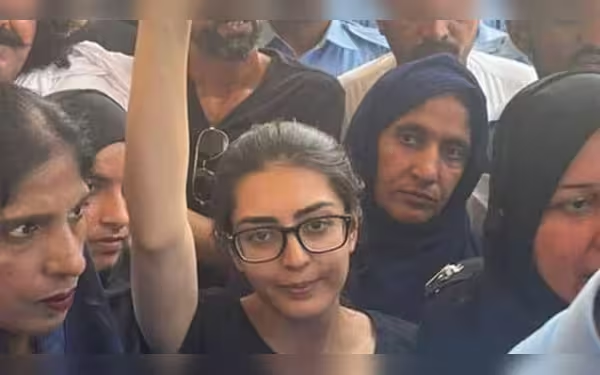Thursday, November 7, 2024 10:46 AM
Imaan Mazari And Haadi Ali Chatha Granted Bail In Islamabad Terrorism Case
- Imaan Mazari and husband released on bail in terrorism case.
- Couple arrested for removing road blockades during England cricket team's visit.
- Legal proceedings raise questions on civil rights and public safety.
 Image Credits: geo
Image Credits: geoImaan Mazari and her husband granted bail in Islamabad after arrest for removing road blockades during England cricket team's visit.
On October 31, 2024, Imaan Mazari, a well-known human rights lawyer, and her husband, advocate Haadi Ali Chatha, were released from jail after an Anti-Terrorism Court (ATC) granted them bail in a case related to a "security breach." This incident has drawn significant attention due to the couple's prominent roles in legal advocacy and human rights in Pakistan.
The ATC Judge, Tahir Abbas, approved their bail against a surety bond of Rs20,000. This decision came after the Islamabad High Court (IHC) overturned a three-day physical remand that had been imposed by the ATC earlier in the week. The IHC, led by Chief Justice Aamer Farooq and Justice Saman Rafat Imtiaz, ordered that the couple be placed on a 14-day judicial remand instead.
The couple was arrested in Islamabad on Monday after they attempted to remove road blockades that had been set up for the traffic protocol of the visiting England cricket team. The First Information Report (FIR) against them includes serious charges under various sections of the Pakistan Penal Code (PPC) and the Anti-Terrorism Act (ATA). These charges include obstructing public servants, rioting, and assaulting police officers.
According to the FIR, the couple's actions were seen as a threat to the security measures in place for the international team, which is treated as a state guest to ensure their safety from potential terror attacks. The report claims that Imaan Mazari called for the barriers to be removed and incited the crowd, while her husband allegedly threatened police officers and even assaulted one of them.
This incident raises important questions about the balance between civil rights and public safety in Pakistan. While the couple's actions may have been driven by a desire to challenge what they perceived as unjust roadblocks, the legal repercussions they face highlight the complexities of navigating activism within the framework of the law.
As the legal proceedings continue, it is crucial for citizens to reflect on the implications of such cases. The intersection of law, human rights, and public safety is a delicate one, and it is essential for all parties involved to engage in constructive dialogue. The outcome of this case may not only affect Imaan Mazari and Haadi Ali Chatha but could also set a precedent for how similar cases are handled in the future.













